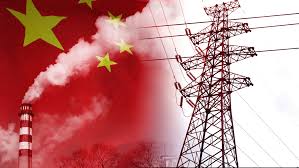
China's evolving energy landscape is presenting a complex picture, with shifts in oil demand and surging electricity use highlighting the country's transition toward cleaner power sources. Despite recent concerns over slower oil consumption, China's electricity generation and liquefied natural gas (LNG) imports have reached new highs in the first half of 2024, underscoring the nation's energy transformation.
While the Organization of the Petroleum Exporting Countries (OPEC) recently cut its estimates for global oil demand growth, citing slower consumption in China, the country's overall energy usage tells a different story. Electricity generation has surged, driven by robust household and industrial demand. At the same time, LNG imports have increased by 10% to their highest level in three years, reflecting China's ongoing shift from polluting fuels to cleaner alternatives.
China's crude oil imports in July fell to their lowest level since September 2022, a decline attributed to weak processing margins and reduced fuel demand at refineries. This drop, amounting to a 12% decrease from the previous month, has disappointed oil market bulls hoping for sustained growth in China's oil purchases. Analysts have noted that China's oil inventories are likely climbing, further dampening demand for imports.
The broader impact of these changes is seen in the automotive sector, where sales of electric and hybrid vehicles have reached a significant milestone. In July, for the first time, half of all vehicles sold in China were either pure electric or hybrid, signaling a major shift away from petroleum products. This increase in clean energy vehicles is driving up electricity demand, further boosting China's power needs.
China's total electricity demand has risen by 32% between 2018 and 2023, making it the highest in the world. Although coal remains the primary source of electricity, its share in the energy mix has been steadily declining. Clean energy sources now account for over 35% of total generation, up from 22% a decade ago. This shift is cementing China's status as the world's largest producer of clean power, even as it continues to be the top global coal consumer.
Natural gas is also playing an increasingly important role in China's energy mix. LNG imports have surged in the first half of 2024, and seasonal demand is expected to push annual totals to new highs. Power firms may opt to favor gas-fired generation over coal if global gas prices remain stable, potentially further reducing coal's dominance in China's energy portfolio.
These developments highlight China's ongoing efforts to balance its energy needs with environmental goals, signalling a complex but determined path toward a cleaner energy future.
(Source:www.naturalgasworld.com)
While the Organization of the Petroleum Exporting Countries (OPEC) recently cut its estimates for global oil demand growth, citing slower consumption in China, the country's overall energy usage tells a different story. Electricity generation has surged, driven by robust household and industrial demand. At the same time, LNG imports have increased by 10% to their highest level in three years, reflecting China's ongoing shift from polluting fuels to cleaner alternatives.
China's crude oil imports in July fell to their lowest level since September 2022, a decline attributed to weak processing margins and reduced fuel demand at refineries. This drop, amounting to a 12% decrease from the previous month, has disappointed oil market bulls hoping for sustained growth in China's oil purchases. Analysts have noted that China's oil inventories are likely climbing, further dampening demand for imports.
The broader impact of these changes is seen in the automotive sector, where sales of electric and hybrid vehicles have reached a significant milestone. In July, for the first time, half of all vehicles sold in China were either pure electric or hybrid, signaling a major shift away from petroleum products. This increase in clean energy vehicles is driving up electricity demand, further boosting China's power needs.
China's total electricity demand has risen by 32% between 2018 and 2023, making it the highest in the world. Although coal remains the primary source of electricity, its share in the energy mix has been steadily declining. Clean energy sources now account for over 35% of total generation, up from 22% a decade ago. This shift is cementing China's status as the world's largest producer of clean power, even as it continues to be the top global coal consumer.
Natural gas is also playing an increasingly important role in China's energy mix. LNG imports have surged in the first half of 2024, and seasonal demand is expected to push annual totals to new highs. Power firms may opt to favor gas-fired generation over coal if global gas prices remain stable, potentially further reducing coal's dominance in China's energy portfolio.
These developments highlight China's ongoing efforts to balance its energy needs with environmental goals, signalling a complex but determined path toward a cleaner energy future.
(Source:www.naturalgasworld.com)














